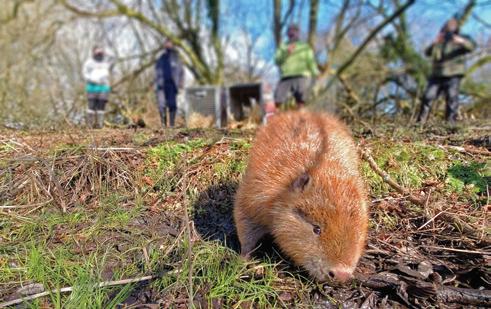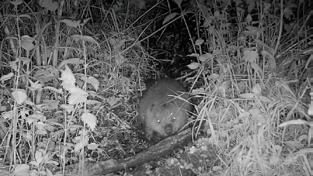
3 minute read
Health & Beauty
Health&Environment First beaver born in Dorset in 400 years
Beavers being released in February 2021. Photograph James Burland
Advertisement
BEAVERS have bred in Dorset for the first time in over 400 years at Dorset Wildlife Trust’s enclosed beaver site in West Dorset. Trail cameras inside the enclosure have captured images of a young beaver, known as a kit, and its mother, exploring the watery woodland created by its parents since they were released in February 2021.
This landmark project for Dorset is hosted by Dorset Wildlife Trust working alongside lead partners, University of Exeter and Wessex
Trail cam image of Dorset’s first beaver in 400 years Water to undertake a scientific study to assess all the impacts that beavers make on the natural environment including river flow, water quality and biodiversity. Since the beavers were introduced to site, they have built dams, creating a wetland to suit their needs but which also provides habitat for many other species, such as frogs and newts which depend on water.
Rivers Conservation Officer, Steve Oliver said, ‘We have been closely monitoring the pair since their release and it has been clear that they have formed a strong bond in the time they have been on site, and this latest discovery is further evidence of this, alongside their industrious dam building activity. The trail cams have only identified one kit so far, but beavers can typically have one to four kits in a litter, and we are discreetly observing their activity to see if any others have been born.
Seeing the first kit is an incredibly exciting moment for the project and breeding is a clear indication of normal behaviour and that the adult pair are healthy and happily settled in their Dorset surroundings. This local project is an enormous step forward on the journey to restore beavers to Dorset, helping us to raise awareness and understanding of what it means to have these influential mammals back in our county. Beavers have the potential to make a huge difference to our natural environment and can assist nature’s recovery as well as providing other benefits for humans.’
To find out more about the Dorset Wildlife Trust’s Beaver project, visit dorsetwildlifetrust.org.uk/BeaverProject.

Treasure the UK’s seaside superheroes this summer!

Exploring Marine Life, photograph by Emma Goddon
JOIN Dorset Wildlife Trusts for rock pool rambles, dolphin watching and eco-crabbing during National Marine Weeks, a two-week summer festival ending Monday 8 August in celebration of the fascinating, colourful, diverse and often surprising marine wildlife found right here in Dorset.
This year, Wildlife Trusts across the UK are celebrating seaside superheroes to shine a light on the extraordinary sea creatures and plants which are helping to fight climate change and water pollution or have amazing powers to help them survive. In Dorset we are very lucky to have the most astonishing marine wildlife, from secretive seahorses and delightful dolphins to colour-changing cuttlefish and rocklicking limpets.
To celebrate Marine Weeks, Dorset Wildlife Trust has planned a series of special events to get families and individuals involved in exploring the seashore and wider marine environment to discover some of the bounty that these habitats have to offer. At Kimmeridge Bay, there will be the opportunity to join a dolphin watching session on the cliff-top look-out, explore underwater marine life on the snorkel trail, or take part in eco-friendly crabbing and rock pooling activities led by our expert wardens.
At the Wild Seas Centre at Kimmeridge, a state-of-the-art underwater camera will broadcast live footage to a screen inside the centre to showing Kimmeridge Bay beneath the waves. All without getting wet! The centre staff will be getting the microscopes out on Plankton Day when visitors can discover the amazing diversity of plankton found in water samples collected from Kimmeridge Bay and also learn about the vital role that these miniature organisms play in our oceans.
Over at Chesil Beach, there’s the chance to join the Strandline Detectives walk to hunt for wildlife treasure washed in from the sea and to find out what lives in the deeper water. Or you can take a trip on the glass-bottomed Fleet Explorer boat, which makes regular trips around part of the spectacular Fleet Lagoon, to explore its incredible underwater wildlife.
To find out dates, details and costs of all the events happening in Dorset for Marine Weeks, go to dorsetwildlifetrust.org.uk/events.










